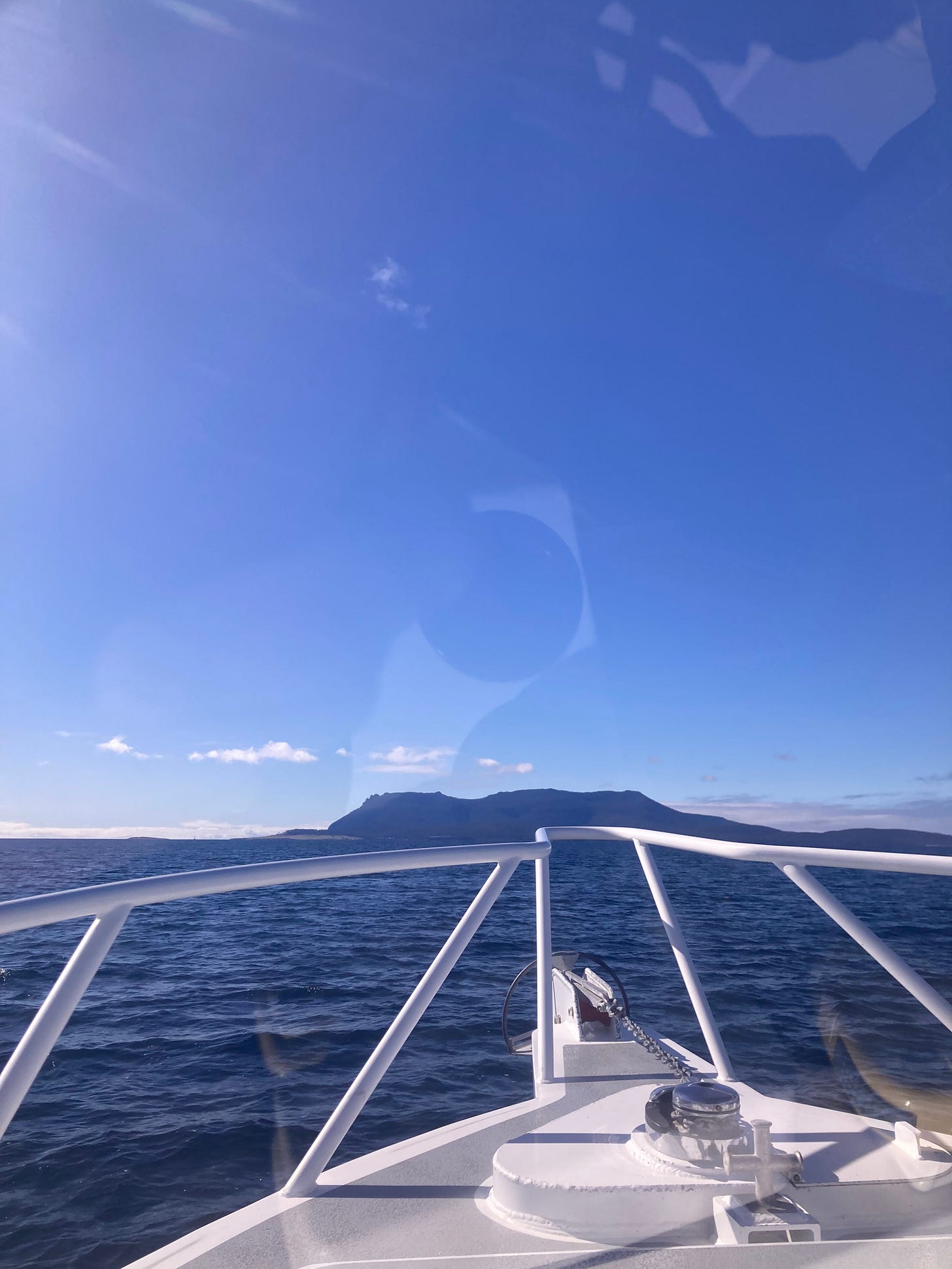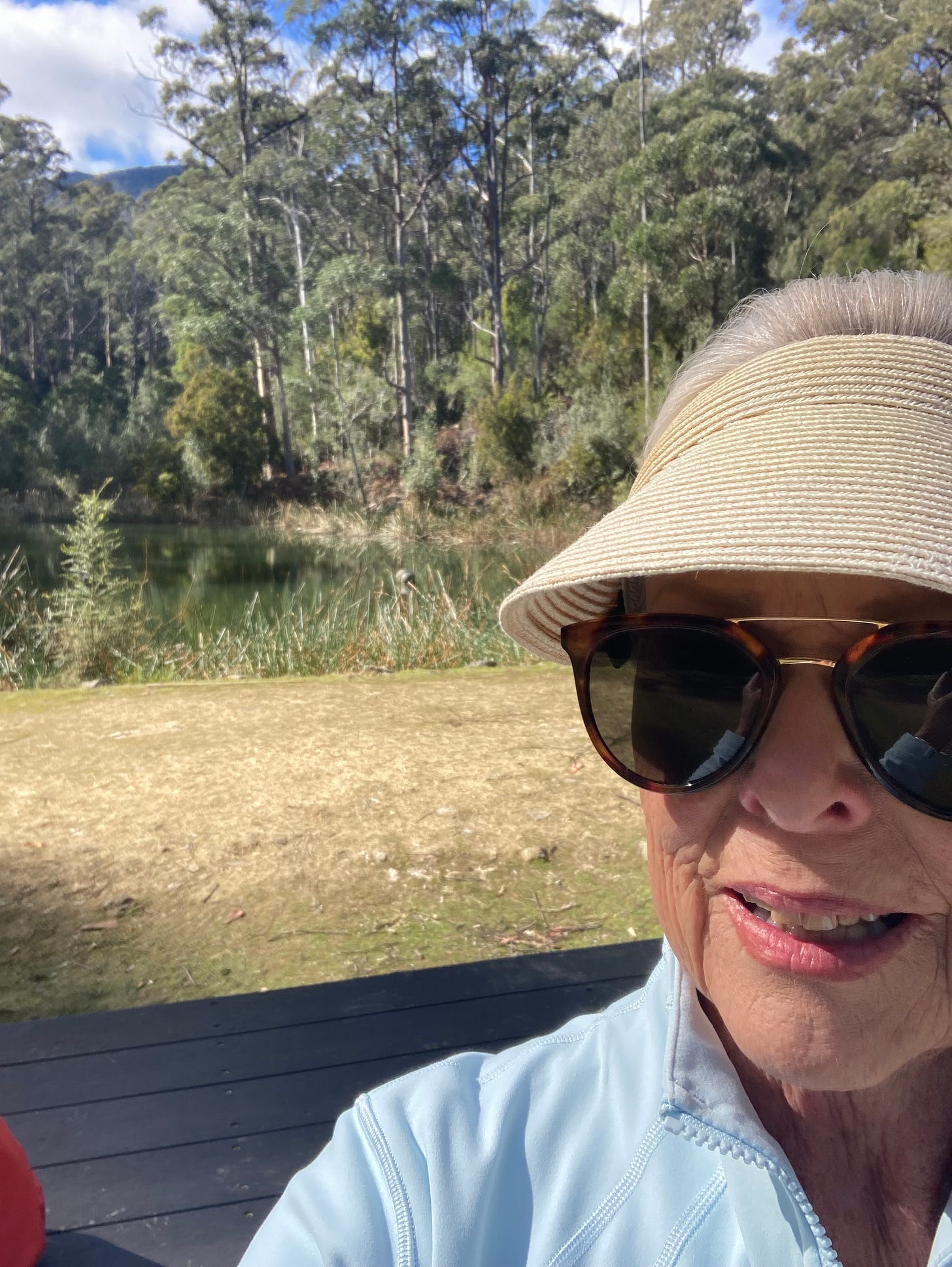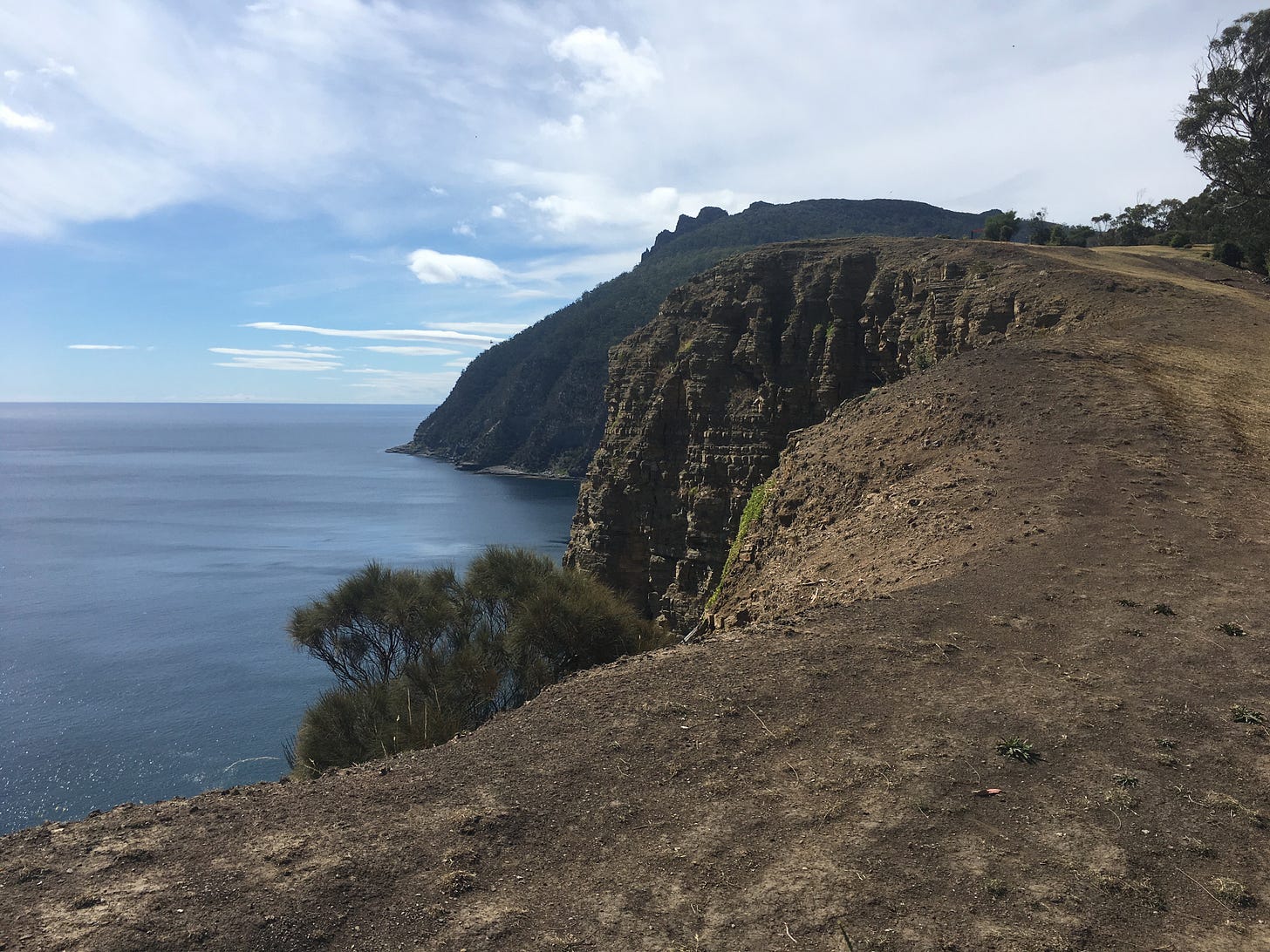The house is filled with the aroma of melted butter, golden syrup and oats. I’ve just pulled a tray of fresh-baked Anzacs from the oven and wishing like mad they’d been available last Saturday when I did a solo-hike.
My husband and son could merely have taken me for a run around the bay in our boat and that very act of being at sea would have been all I could ask for (I’m easily pleased). The sound of the sea creaming past the sides, of early morning sun sparkling through the diaphanous spray. Of watching gannets diving for food, seeing the odd seal, maybe a white bellied sea-eagle (my spirit animal but that’s another story).
But instead, the men took me to the Maria Island jetty across Mercury Passage. I jumped off, shouldered my drybag and waved them off on their fishing jaunt, content because I knew I would have the island almost totally to myself. What an early morning privilege!
I set a path for the Reservoir, a tranquil spot deep in the bush. The birds sang with pristine clarity in a space that was empty of people – empty except for me and I revelled in their performance. They sang as if the stage was theirs alone (which it was) but I wonder if seeing me sitting on a weathered bench deep in the hinterland of the island, they rather revelled in an audience, even if it was solitary.
They were extraordinary songbirds, so that a few nights later, I took note of a glorious nugget of evolutionary fact whilst watching Julia Zemiro’s Great Australian Walks on SBS On Demand. I learned that the 50 million songbirds across our world are all descended from the songbirds of Gondwana Land (Australia)
Ah, the memory of sitting in the stalls under the arching branches of tall eucalypts, with draping bark hanging like theatre curtains while the birds performed took on a whole new meaning.
My Time:
In my contemporary fiction, Passage, Annie (the lead character), solo-hikes up Maria Island’s Bishop and Clerk as a journey of absolution after her husband dies in a cruel farm accident. I traversed the same route with my husband before I wrote the book so that I could walk in Annie’s shoes. Often, whenever I return to the island, I think of Annie and her passage through smothering grief to a place of peace and acceptance.
On Saturday, I walked alone like Annie, but my heart wasn’t broken. I still had my soulmate. But I listened to the bush song through Annie’s ears and looked at the bushland through Annie’s eyes.
I know when Annie walked along the top of the vertiginous Fossil Cliffs that she would have felt dizziness and fear that Alex wasn’t there to stop her falling over the edge. I know that when she sat in the sun at the Miller’s Cottage, she would have marvelled at the circle walked by a heavy horse a century and a half before. Mused too that the horse would have shared a ship with hundreds of transported convicts.
She would have smelled the essence of grain and flour on the air, and wondered if the miller’s wife ever felt lonely living on the edge of the world with only panoramas to soothe her soul each day and precious little female friendship.
But then I left Annie to her musings and walked on. In my own shoes, this time. And as the ferry arrived and disgorged tourists and as my peaceful meanderings were impinged upon, I glanced at the incomers and saw groups and pairs, but no solo-hikers. I realised that I’d achieved something unique for that day.
I had accomplished the hike alone. I had let my thoughts run loose and free. I had listened to the tuneful silence of the bush. I had stepped where my feet led me.
I had talked nonsense to the wombats and native hens, to the Cape Barren geese and wallabies. They ignored me of course, as they ignore all the interlopers –putting humans in their rightful place as just another part of a natural world. No place for ego at all!
Whilst I waited for my husband and son to collect me, after walking over 10kms in three hours, I wandered along the white beach of Darlington. Through the veil of history, there were 19th century barques and brigs disgorging convicts. Those same convicts would have seen obscure foliage, puzzling animals and birds and an aquamarine sea. They would know that escape was impossible because of sharks offshore and that weather blew up the Mercury Passage to capsize any fragile craft in an instant. And who could swim anyway?
They would see a small handful of elegant Georgian buildings built from honey-coloured sandstone blocks cut with their own toil. They would think of their families in far off England, Ireland and Scotland and know in their hearts that their previous lives were nothing but a memory and even that growing fainter by the day because they were, in effect, dead to the world.
Meanwhile, as a descendant of one such convict, I thanked the stars for my ancestor’s misdemeanour because without it, I wouldn’t be who I am and I wouldn’t have stood on the white sands of that ark of an island, walking briefly in his shoes.
Such a thought probably implies music from the convict era but instead, I thought birdsong might be more appropriate.
But then I thought something cool wouldn’t go astray, so I chose:
I know she’s walking by the river, but I’ll just pretend she’s walking by the sea.







I loved this post Prue: loved going for the walk with, and learning its parallel history, and, of course all the wildlife. Your words were a very lyrical way to welcome in the day. I tuned on the bird recording and at the same time had our local birds singing outside: it was fantastic!
Prue, it does my heart so much good to walk with you on these "pilgrimages." This week, my Sydney-resident daughter is here in the States with me, but it wasn't two weeks ago that she saw her first wombat, while at a little Air BnB away from the city. She's been hoping for a sighting since she arrived! And, here's yours, up close and cuddly. Your steps help me imagine hers, and vice versa.
I bought a pack of Anzacs while I was there a year ago and was totally smitten. Thank you for the recipe, which I may have to try tomorrow!
This, though, melted my heart: "Meanwhile, as a descendant of one such convict, I thanked the stars for my ancestor’s misdemeanour because without it, I wouldn’t be who I am and I wouldn’t have stood on the white sands of that ark of an island, walking briefly in his shoes."